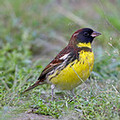 針對生物多樣性行動計畫,歐盟做出第一次的成果評估,結果發現如果歐盟在2010年前再不採取「大動作」,生物多樣性將持續流失。
針對生物多樣性行動計畫,歐盟做出第一次的成果評估,結果發現如果歐盟在2010年前再不採取「大動作」,生物多樣性將持續流失。
2006年,歐洲共同體發表了「2010中止生物多樣性流失行動計畫」,裡頭闡述了具體行動以及歐洲共同體與會員國的責任規章。然而根據這份歐盟在2008年12月稍早的報告,儘管「自然2000網絡計畫」(Natura 2000 Network)的保護範圍有所延伸,在生物多樣性方面也做了重大投資但要在其他部門的政策中整合進生物多樣性與生態系統考量,仍遭遇到相當大的困難;該報告說,若歐盟仍想在2010年達成原定目標,不論整個歐洲共同體與或每個會員國,都非要再投注更多心力不可。
新出爐的報告即是在2010年期限前最後檢討的大好機會。報告針對歐盟生物多樣性、歐盟與全球生物多樣性、生物多樣性與環境變遷、生物多樣性知識庫等四大政策面來談;各會員國成果報告也第一次一併納入報告中。國際鳥盟(BirdLife International)認為,從報告中看來,「理想與現實仍有很大差距」。
該聯盟歐盟分部歐盟政策主任凱瑞司(Konstantin Kreiser)說:「什麼時候,如果不是現在,政府才會學到這一課?短視近利的人們在不久的將來會付出代價!」
 歐洲環保聯盟(The European Environmental Bureau,EEB)表示,想要同時保護並恢復生物多樣性,歐盟應做出更好的政策規劃,必須比現行「自然2000網絡計畫」、「歐盟水資源管理方針」(Water Framework Directive)等更好,也必須在「綠色基礎建設」(Green Infrastructure)的發展上做出投資。該聯盟建議,歐盟未來必須在廢棄物與生產政策上,多著重於資源循環再利用與回收材質再利用,以降低採礦等作業對生態系統的生態壓力。
歐洲環保聯盟(The European Environmental Bureau,EEB)表示,想要同時保護並恢復生物多樣性,歐盟應做出更好的政策規劃,必須比現行「自然2000網絡計畫」、「歐盟水資源管理方針」(Water Framework Directive)等更好,也必須在「綠色基礎建設」(Green Infrastructure)的發展上做出投資。該聯盟建議,歐盟未來必須在廢棄物與生產政策上,多著重於資源循環再利用與回收材質再利用,以降低採礦等作業對生態系統的生態壓力。
歐盟執委會環境執委狄瑪斯(Stavros Dimas)表示,雖然歐盟在《土壤框架指令》(Soil Framework Directive)上仍存有重大漏洞,推展失敗,但針對海洋與淡水生態系統的保育工作都有進展,例如《海洋策略指令》(Marine Strategy Directive)的通過便是著名的例子。
狄瑪斯說,即便「生物多樣性所帶來的利益還有待界定」,歐盟會員國目前越來越積極運用歐盟的基金來支持自然環境與生物多樣性,尤其是在農業及地方性發展計畫相關的計畫上,著力更深。
The European Union will fail to meet its goal of halting the loss of biodiversity by 2010 unless there is "enormous effort" over the next two years, according to the EU's the first comprehensive assessment of progress in implementing its Biodiversity Action Plan.
Despite the further extension of the Natura 2000 network of protected areas and important investments in biodiversity, the integration of biodiversity and ecosystem concerns into other sectoral policies remains a challenge, states the report, released earlier this month. Intensive efforts will be needed, at the level of both the European Community and the member states, if the EU is to even approach its objective.
In 2006, the European Commission produced an Action Plan to halt biodiversity loss by 2010, setting out concrete actions and outlining the responsibility of European Community institutions and member states.
The new report represents the last real opportunity for stock-taking before 2010. The report studies four main policy areas - biodiversity in the EU, the EU and global biodiversity, biodiversity and climate change, and the knowledge base. A summary of progress in each member state is included for the first time. BirdLife International says the most revealing aspect of the report is the "huge gap between stated ambition and real action."
"When, if not now, will governments learn this lesson?" "Focusing only on short-term profits leads to huge costs for the society in the long-run," said Konstantin Kreiser, EU policy manager at the BirdLife European Division.
The European Environmental Bureau(EEB) says to protect and restore biodiversity, the European Union needs much better implementation of existing policies, such as Natura 2000 and the Water Framework Directive, and investment in the development of a "green Infrastructure."
The EU must prioritize recycling and the use of recycled materials in waste and product policies to reduce ecosystem pressure from mining operations, the federation advises.
There is progress too in the protection of marine and freshwater ecosystems, notably with the adoption of the new Marine Strategy Directive, although the failure to adopt the Soil Framework Directive leaves a major legislative gap, the commissioner said.
Member states are increasingly making use of EU funds to support nature and biodiversity, especially in relation to agriculture and regional development policies, although, said Environment CommissionerDimas, "the real benefits for biodiversity remain to be determined."




